Vet Clinic FAQs
 NEUTERING POLICY: There are thousands of stray and unwanted cats and dogs in the UK without homes to go to, simply because too many people allow their pets to have a litter of puppies or kittens. The Celia Hammond Animal Trust is a charity. Our main objective is to humanely reduce the population of dogs and cats, both pedigree and mongrel, in the UK, by neutering. To qualify for treatment at our clinics your pet must be neutered or going to be neutered as soon as possible. We are very happy to discuss neutering and the benefits of neutering your pet with you, and also have a range of information leaflets available at our clinics. Further information is also available on our website – Please visit our Neutering Info page on our website.
NEUTERING POLICY: There are thousands of stray and unwanted cats and dogs in the UK without homes to go to, simply because too many people allow their pets to have a litter of puppies or kittens. The Celia Hammond Animal Trust is a charity. Our main objective is to humanely reduce the population of dogs and cats, both pedigree and mongrel, in the UK, by neutering. To qualify for treatment at our clinics your pet must be neutered or going to be neutered as soon as possible. We are very happy to discuss neutering and the benefits of neutering your pet with you, and also have a range of information leaflets available at our clinics. Further information is also available on our website – Please visit our Neutering Info page on our website.
On this page we aim to provide answers to a range of your most common enquiries about using our veterinary services. If you can't find the answer to your query please do give us a call.
- Am I eligible to use The Celia Hammond Animal Trust's Veterinary clinics?
- What services do you provide?
- Do I need to book an appointment?
- What are your opening hours?
- Do you have an emergency out of hours service?
- What are your charges?
- At what age should I neuter my kittens?
- My cat has recently had kittens, when should I neuter her?
- At what age should I neuter my puppy?
- My dog has recently had puppies when can I get her neutered?
- Do you neuter and treat other animals or just cats and dogs?
- Do you neuter and treat strays?
- I would like to get my pet microchipped – do I need an appointment?
- My pet has fleas do I need an appointment?
- My pet has worms do I need an appointment?
- I have just got a new puppy – what vaccinations does he/ she need and when?
- I have just got a new kitten – what vaccinations does he/ she need and when?
- My cat needs to come to your clinic but I don't have a cat carrying basket…
- I have no transport, can you help?
- I can't afford to pay but my pet needs to see a vet…
- How do I get to your clinics?
 1. Am I eligible to use The Celia Hammond Animal Trust's veterinary clinics? Our low cost veterinary services are available to pets belonging to owners who cannot afford private veterinary fees. This includes owners on benefits, a low income, working part time, students and pensioners. We do not stipulate specific benefits that you must receive or a maximum income level beyond which you cannot use our services. Your pet's health and welfare are our priority. If you are unable to afford private veterinary fees please contact us to discuss your situation. *Our services are constantly in great demand and our clinics are very busy, so we do ask that if you can afford to use a private veterinary practice that you please do so – in order that our services are available for animals that rely on our help.* We do also recommend that where possible pet owners take out pet insurance so that their pets can receive treatment at a private vet in future. If you are in receipt of certain state benefits you may be eligible to obtain treatment for your pet at another London animal charity hospital – PDSA, Blue Cross or RSPCA. If you are eligible for treatment at one of the above hospitals we will advise that you contact them first. We do not have a catchment area but we will consider the health of your animal and how long your journey to reach us will be when advising you whether our clinic is the best option for your pet.
1. Am I eligible to use The Celia Hammond Animal Trust's veterinary clinics? Our low cost veterinary services are available to pets belonging to owners who cannot afford private veterinary fees. This includes owners on benefits, a low income, working part time, students and pensioners. We do not stipulate specific benefits that you must receive or a maximum income level beyond which you cannot use our services. Your pet's health and welfare are our priority. If you are unable to afford private veterinary fees please contact us to discuss your situation. *Our services are constantly in great demand and our clinics are very busy, so we do ask that if you can afford to use a private veterinary practice that you please do so – in order that our services are available for animals that rely on our help.* We do also recommend that where possible pet owners take out pet insurance so that their pets can receive treatment at a private vet in future. If you are in receipt of certain state benefits you may be eligible to obtain treatment for your pet at another London animal charity hospital – PDSA, Blue Cross or RSPCA. If you are eligible for treatment at one of the above hospitals we will advise that you contact them first. We do not have a catchment area but we will consider the health of your animal and how long your journey to reach us will be when advising you whether our clinic is the best option for your pet.
2. What services do you provide? Our veterinary clinics are fully equipped to provide a wide range of treatments and surgical procedures. Each clinic has X-Ray facilities, endoscopes, ultrasound scanners, and haematology/ biochemistry machines, allowing us to run blood tests immediately. Two of our vets are extremely experienced in fracture repairs.
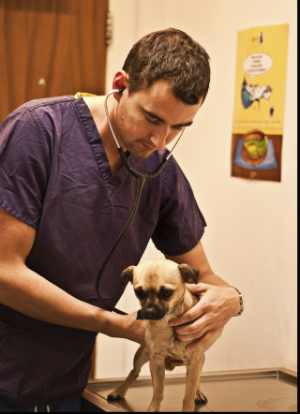
3. Do I need to book an appointment? “Yes” for consultations, surgery and vaccinations for dogs, puppies or ferrets and for cat, kitten and rabbit vaccinations. CONSULTATIONS If your pet is unwell and needs to see a vet, please call us to make an appointment. Our receptionist will ask what symptoms your pet has to decide how soon your pet needs to be seen. We have emergency as well as routine appointments available. SURGERY If your pet requires routine surgery – for example, neutering – you will need to make an appointment. Please phone whichever clinic is closest to you to book an appointment. For their own safety cats must be in a secure cat carrying basket at all times.
4. What are your opening hours? Our usual opening hours are Monday to Friday 9am – 5.30pm.
5. Do you have an emergency out of hours service? Unfortunately due to the current national shortage of vets we are currently unable to provide our own emergency out of hours service. In an emergency outside of normal hours please phone us and listen to the answer machine message for instructions. – Lewisham (020 8691 2100) or Canning Town (020 7474 8811).
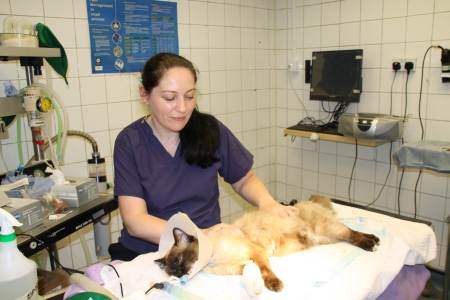 6. What are your charges? CHAT is a small charity and we do have to try and recover as much of our costs as possible in order to keep our services running. Our veterinary services are low cost compared to that which you would expect to pay at a private veterinary practice. However our services are not free, nor is it a case of making a donation towards the cost. If you genuinely cannot pay even our reduced fees we will try to help you in some other way. Please visit our Treatment Prices page on our website
6. What are your charges? CHAT is a small charity and we do have to try and recover as much of our costs as possible in order to keep our services running. Our veterinary services are low cost compared to that which you would expect to pay at a private veterinary practice. However our services are not free, nor is it a case of making a donation towards the cost. If you genuinely cannot pay even our reduced fees we will try to help you in some other way. Please visit our Treatment Prices page on our website
7. At what age should I neuter my kitten? Cats breed very rapidly – how many times do we hear someone tell us that their cat got pregnant before they had a  chance to neuter her, but she was still only a kitten! Female kittens are able to become pregnant at just 4 months old. The Celia Hammond Animal Trust, along with other animal charities such as Cats Protection and the RSPCA, recommend neutering by 4 months old to protect against accidental pregnancy. We routinely neuter our kittens that we rescue and rehome and feral kittens at 9-10 weeks old. You should plan to neuter your kitten by 4 months of age. For more information about the benefits of neutering, please visit our Neutering Info page on our website
chance to neuter her, but she was still only a kitten! Female kittens are able to become pregnant at just 4 months old. The Celia Hammond Animal Trust, along with other animal charities such as Cats Protection and the RSPCA, recommend neutering by 4 months old to protect against accidental pregnancy. We routinely neuter our kittens that we rescue and rehome and feral kittens at 9-10 weeks old. You should plan to neuter your kitten by 4 months of age. For more information about the benefits of neutering, please visit our Neutering Info page on our website
8. My cat has recently had kittens, when should I neuter her? If you have a cat that has given birth, she needs to be neutered when her kittens are 6 weeks old to prevent her becoming pregnant again. Don’t worry if the kittens are still feeding from her, neutering will not affect her milk supply and we neuter from the flank (side) rather than midline (underneath), so it won’t be uncomfortable for her to continue feeding her kittens after she is neutered. When booking your cat's appointment and upon admission please let us know that that your cat has kittens at home so that we can prioritise her neutering operation so that she will be amongst the first cats able to go home that afternoon. For more information about the benefits of neutering, please visit our Neutering Info page on our website
 9. At what age should I neuter my puppy? For both male and female puppies we generally recommend neutering at 4–6 months old dependent on size and/or breed. For more information about the benefits of neutering your dog, please visit our Neutering Info page on our website
9. At what age should I neuter my puppy? For both male and female puppies we generally recommend neutering at 4–6 months old dependent on size and/or breed. For more information about the benefits of neutering your dog, please visit our Neutering Info page on our website
10. My dog has recently had puppies when can I get her neutered? We advise neutering your dog when her puppies are between 8 and 12 weeks old. For more information about the benefits of neutering your dog, please visit our Neutering Info page on our website
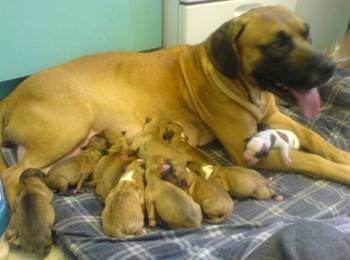
11. Do you neuter and treat other animals, or just cats and dogs? We neuter other pet animals including rabbits, guinea pigs, ferrets, chinchillas and rats. We can treat most usual pet animals, but don’t currently have any vets specialising in exotics.
12. Do you neuter and treat strays? We do neuter and treat stray and feral cats. Please call us for advice before taking any steps to capture cats yourself or before using traps from another source. Traps used incorrectly can cause more problems than they solve. In conjunction with other charity neutering schemes we can usually neuter stray cats for free – although if you can pay or make a donation it helps funds stretch further! If you find a stray dog by law you should contact your local Council Animal Warden. If you wish to look after a stray dog you have found you must notify Battersea Dogs Home and leave a description of the dog and your contact details, as well as notify your local Council Animal Warden that you are caring for the dog. Battersea Dogs Home telephone number: 020 7627 9245
13. I would like to get my pet microchipped – do I need an appointment? We provide microchipping for £11. It is the law that all dogs must be microchipped by 8 weeks old. From the 10th June 2024 cats must be microchipped by five months old.
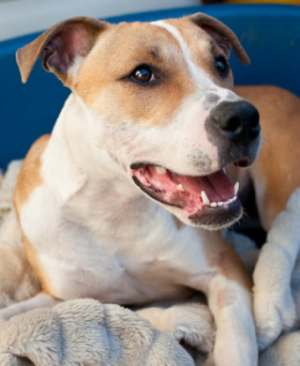 14. My pet has fleas – do I need an appointment? The flea products that we sell (with the exception of Frontline and Advantage) are prescription products. Just like when you visit your doctor and are given a prescription to take to the chemist, these products are by law required to be prescribed by a vet. However once your pet has been seen by the vet you can return to us to buy prescription flea treatments over the counter for the next 6 months. Prescription flea treatments are very effective and when used according to the instructions have a very high level of safety. There are products that you can buy without a prescription in pet shops and supermarkets. However, many of these are reported to be ineffective and there have been serious concerns over the safety of some of these products. We would always advise you to obtain your flea products from a vet. Frontline is the only product sold in pet shops and by supermarkets that we recommend to be safe (provided it is used in accordance with the instructions). Advantage can also be purchased ‘over the counter’ but, unlike Frontline, is not widely available apart from via veterinary surgeries. Please phone us if you are unsure if your pet needs an appointment. We do not charge a fee for your pet to have a 'flea check' but you will need to pay for flea treatment products. We do also sell single treatments as well as packs containing enough treatments for three, four or six months. Treating your pet fleas may not be sufficient, you may need use an environmental spray in your home as well to control the fleas. Along with all veterinary practices we do sell household fleas spray.
14. My pet has fleas – do I need an appointment? The flea products that we sell (with the exception of Frontline and Advantage) are prescription products. Just like when you visit your doctor and are given a prescription to take to the chemist, these products are by law required to be prescribed by a vet. However once your pet has been seen by the vet you can return to us to buy prescription flea treatments over the counter for the next 6 months. Prescription flea treatments are very effective and when used according to the instructions have a very high level of safety. There are products that you can buy without a prescription in pet shops and supermarkets. However, many of these are reported to be ineffective and there have been serious concerns over the safety of some of these products. We would always advise you to obtain your flea products from a vet. Frontline is the only product sold in pet shops and by supermarkets that we recommend to be safe (provided it is used in accordance with the instructions). Advantage can also be purchased ‘over the counter’ but, unlike Frontline, is not widely available apart from via veterinary surgeries. Please phone us if you are unsure if your pet needs an appointment. We do not charge a fee for your pet to have a 'flea check' but you will need to pay for flea treatment products. We do also sell single treatments as well as packs containing enough treatments for three, four or six months. Treating your pet fleas may not be sufficient, you may need use an environmental spray in your home as well to control the fleas. Along with all veterinary practices we do sell household fleas spray.
15. My pet has worms – do I need an appointment? Sometimes. We sell a variety of worm treatments over the counter as well as some which are included within prescription flea 'spot on' preparations – for which your pet will need an appointment or to have seen our vets within the last 6 months. We usually need to know your pet's approximate weight, so if it's for your dog and you don't know his or her weight it may be an idea to bring them with you to be weighed.
16. I have just got a new puppy – what vaccinations does he/she need and when? Puppies need a course of vaccinations ideally at 8 and 12 weeks or 9 and 12 weeks of age. Some breeds are particularly susceptible to Parvovirus 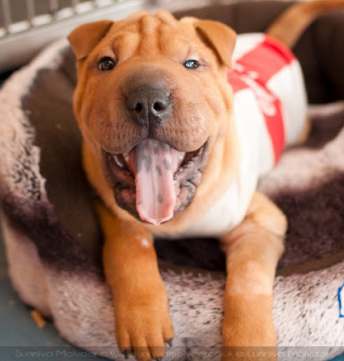 which can kill e.g. Rottweilers. For these ‘black and tan’ breeds we recommend a third vaccination at 16 weeks. If the dog is over 12 weeks it will a need second vaccination 2–5 weeks later. Vaccinations are to protect against Canine Distemper, Parvovirus, Adenovirus (Hepatitis), Leptospirosis, and Parainfluenza. A booster vaccination is required once a year to maintain levels of protection against these diseases. Your puppy may also require flea and worm treatments and our vet will advise you about this at the time of vaccination. Vaccinations for puppies are very important – puppies should not be allowed contact with other dogs or to walk on the pavement until fully vaccinated.
which can kill e.g. Rottweilers. For these ‘black and tan’ breeds we recommend a third vaccination at 16 weeks. If the dog is over 12 weeks it will a need second vaccination 2–5 weeks later. Vaccinations are to protect against Canine Distemper, Parvovirus, Adenovirus (Hepatitis), Leptospirosis, and Parainfluenza. A booster vaccination is required once a year to maintain levels of protection against these diseases. Your puppy may also require flea and worm treatments and our vet will advise you about this at the time of vaccination. Vaccinations for puppies are very important – puppies should not be allowed contact with other dogs or to walk on the pavement until fully vaccinated.
17. I have just got a new kitten – what vaccinations does he/she need and when? Kittens should begin their vaccinations at 9 weeks old. A course of vaccinations is two injections 3-4 weeks apart. There are two types of vaccinations available for cats. The basic vaccination is against feline enteritis and upper respiratory tract disease (cat flu). This vaccination is recommended for all cats. There is an additional vaccination against viral leukemia (FELV). This is recommended for cats that go outdoors or cats that may be mixing with cats that may be FELV positive. If your cats will be indoors only and will not be mixing with other cats they do not need to be vaccinated against leukemia. A booster vaccination is required once a year to maintain levels of protection against these diseases. In addition to vaccinations, your kitten may need worming and flea treatment – our vet will discuss and advise you about this at the time of vaccination.
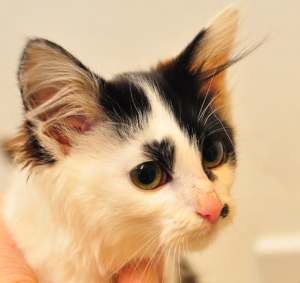 18. My cat needs to come to your clinic but I don't have a cat carrying basket… For their own safety cats must always be brought to us in a secure cat carrying basket. There are often dogs in our waiting rooms that may scare your cat and both clinics are situated on busy main roads. We sell a variety of new cat carrying baskets: Small - £13.50 & Large - £17.50. We also usually have second-hand baskets priced from £5 and do also loan second-hand baskets for a returnable deposit of £5. Please pop in to obtain a cat basket prior to your cat's appointment.
18. My cat needs to come to your clinic but I don't have a cat carrying basket… For their own safety cats must always be brought to us in a secure cat carrying basket. There are often dogs in our waiting rooms that may scare your cat and both clinics are situated on busy main roads. We sell a variety of new cat carrying baskets: Small - £13.50 & Large - £17.50. We also usually have second-hand baskets priced from £5 and do also loan second-hand baskets for a returnable deposit of £5. Please pop in to obtain a cat basket prior to your cat's appointment.
19. I have no transport, can you help? We do not have a transport service, but our cat rescue staff and volunteers will collect and return cats for neutering if it is not possible for you to bring your pet to us, and may be able to help with transporting dogs for neutering if there is no other alternative. In an emergency, if there is no other alternative and a member of our rescue team is available we will try and help with transportation if we can. Our rescue staff and volunteers are extremely busy and unfortunately cannot help with transporting animals for more routine reasons such as vaccinations. Also, for insurance reasons, they cannot provide transport for owners to accompany animals to or from our clinics.
20. I can't afford to pay but my pet needs to see a vet… Our priority is always to ensure that animals that need veterinary care do receive it. Please contact us as we may be able to refer you to another London animal charity who will accept a donation. We may be able to obtain funding from elsewhere (particularly for the purpose of neutering).
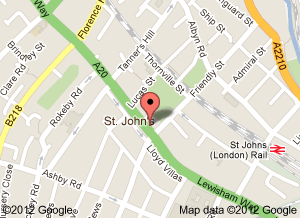 21. How do I get to your clinics? Lewisham Clinic, 233-235, Lewisham Way, London, SE4 1UY Lewisham Way is the main A20 and runs between Lewisham and New Cross. Our clinic is situated towards the New Cross end. If you are looking on a map the Lewisham Clinic is very close to the junction with Friendly Street SE8. The clinic has a large blue and white sign which says Celia Hammond Animal Trust Veterinary and Neuter Clinic. BUSES: Lewisham Way is a main bus route, and the following buses regularly pass our clinic: 21, 436, 136 and 321. The bus stop is Lucas Street in either direction. TRAINS: The overland station of St. Johns is a 5-minute walk from us. Lewisham train station and New Cross train station are both a 10-minute walk. BY CAR: Lewisham Way is a red route, so do not attempt to park directly outside as you will get a parking ticket. There is a loading bay on the road outside which you can stop in between 10am and 4pm if you are actively unloading. If you are accompanying someone who can get out and take the animal into the clinic whilst the driver then goes immediately to park this is ok, but do not leave your vehicle unattended here or you risk getting a parking ticket. There is unrestricted parking in the local side streets on the Brockley side of the clinic and this is where we recommend parking whilst you attend the clinic. *Please do not park on the pavement against the front of our clinic – this area is for use by our rescue vehicles only.*
21. How do I get to your clinics? Lewisham Clinic, 233-235, Lewisham Way, London, SE4 1UY Lewisham Way is the main A20 and runs between Lewisham and New Cross. Our clinic is situated towards the New Cross end. If you are looking on a map the Lewisham Clinic is very close to the junction with Friendly Street SE8. The clinic has a large blue and white sign which says Celia Hammond Animal Trust Veterinary and Neuter Clinic. BUSES: Lewisham Way is a main bus route, and the following buses regularly pass our clinic: 21, 436, 136 and 321. The bus stop is Lucas Street in either direction. TRAINS: The overland station of St. Johns is a 5-minute walk from us. Lewisham train station and New Cross train station are both a 10-minute walk. BY CAR: Lewisham Way is a red route, so do not attempt to park directly outside as you will get a parking ticket. There is a loading bay on the road outside which you can stop in between 10am and 4pm if you are actively unloading. If you are accompanying someone who can get out and take the animal into the clinic whilst the driver then goes immediately to park this is ok, but do not leave your vehicle unattended here or you risk getting a parking ticket. There is unrestricted parking in the local side streets on the Brockley side of the clinic and this is where we recommend parking whilst you attend the clinic. *Please do not park on the pavement against the front of our clinic – this area is for use by our rescue vehicles only.*
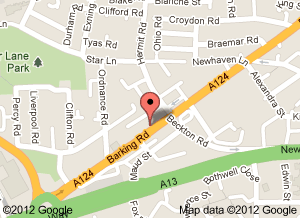 Canning Town Clinic, 151-153, Barking Road, London, E16 4HQThe Canning Town Clinic is situated on the main A124, not far from the junction with Hermit Road E16. The clinic is situated behind a bus stop and has a large black and white sign which says Celia Hammond Animal Trust Cat and Dog Neuter Clinic. BUSES: There is a bus stop directly outside the clinic and opposite the clinic. Buses serving this route are 5, 115, 69, 300 and 276. TRAINS: Canning Town station is a 5 minute walk away from Underground and Docklands Light Railway connections. BY CAR: There is no parking at the Canning Town Clinic. There is limited short stay parking on the Barking Road and in local side streets.
Canning Town Clinic, 151-153, Barking Road, London, E16 4HQThe Canning Town Clinic is situated on the main A124, not far from the junction with Hermit Road E16. The clinic is situated behind a bus stop and has a large black and white sign which says Celia Hammond Animal Trust Cat and Dog Neuter Clinic. BUSES: There is a bus stop directly outside the clinic and opposite the clinic. Buses serving this route are 5, 115, 69, 300 and 276. TRAINS: Canning Town station is a 5 minute walk away from Underground and Docklands Light Railway connections. BY CAR: There is no parking at the Canning Town Clinic. There is limited short stay parking on the Barking Road and in local side streets.
